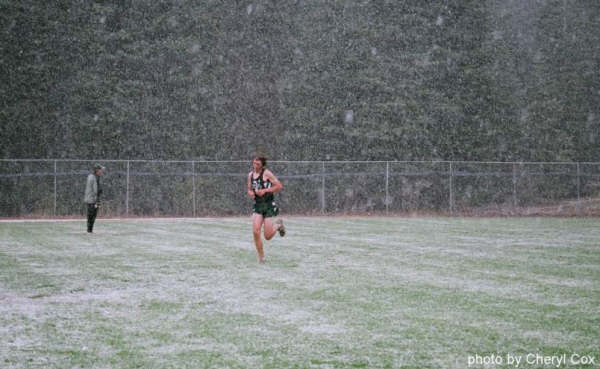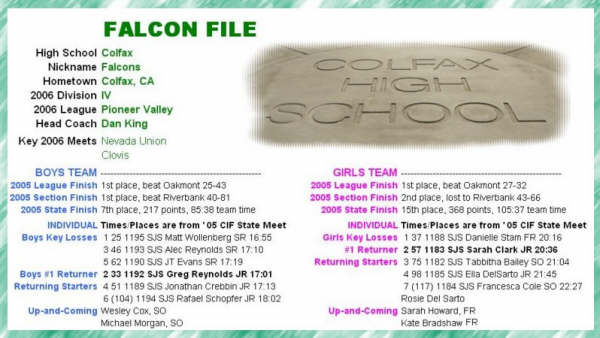
Joe Hartman's Profile on the
Sac-Joaquin Section Team of the Week
COLFAX HS FALCONS!
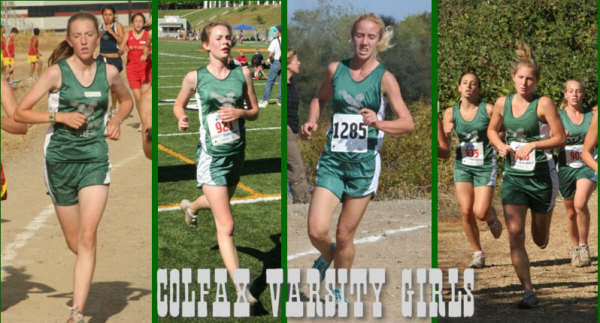
By Joe Hartman, DyeStatCal
For this week’s Sac-Joaquin
Section Team of the Week, we chose a beautiful late summer day to journey
to the Sierra foothills and check out Colfax High School. Scorching
heat and dry, smoky air from the Ralston Fire near Foresthill had blanketed
the western Sierras and Sacramento Valley with suffocating fumes for
days – causing the cancellation of several league meets. But the
weather – and conditions – had finally broken on Sept 14th
, and it could not have been a nicer day in the town of Colfax, which
sits at an elevation of 2400 feet. Colfax lies northeast of Sacramento
along I-80 about 15 miles north of Auburn and 15 miles east of Grass
Valley, which happens to be the home of new head cross country coach
Dan King.
While Coach King has been
training runners in these parts for around ten years, this is his maiden
voyage at the helm of the Colfax Falcons. He inherits a very strong
team from the previous coach Angie Williams, who took both the boys
and girls teams to the state meet in 2005. The Colfax boys have been
on a tear as of late winning the only two cross country section titles
in school history in 2004 and 2005. The girls are doing their best to
keep pace: they have steadily ascended from 5th at section finals in
2003 to 4th in 2004 to the runner-up position in the Section in 2005.
Their November 10th D4 showdown with Bret Harte at section finals (which
may evolve into a three-way battle with Christian Brothers) is a little
too close to call right now.
For 2006, the boys team
loses three of the top five runners, but still appears to be strong
– and guardedly optimistic, as you’ll see below. Jon Crebbins
is over an early season injury and took 7th at the recent Nevada Union
Invitational small school race, joining Wesley Cox and Greg Reynolds
in the Top 10 there. Reynolds was a minute faster versus his 2005 time
and NU and Cox was 44 seconds faster than last year. The boys are currently
ranked 11th in the SJS.
On the girls side, Danielle
Stam (Colfax #1 at state) did not return to the team, but was more than
adequately replaced by incoming freshman Sarah Howard who is off to
a great start so far in 2006. Howard won her first two frosh/soph races
at Granite Bay and Rocklin and moved up to varsity at North Tahoe and
responded with a victory there. She came back the very next day and
took second at the Nevada Union. Sarah Clark provides the maturity and
leadership and along with senior twins Ella and Rosie Del Sarto will
keep the 14th-ranked Falcons focused.
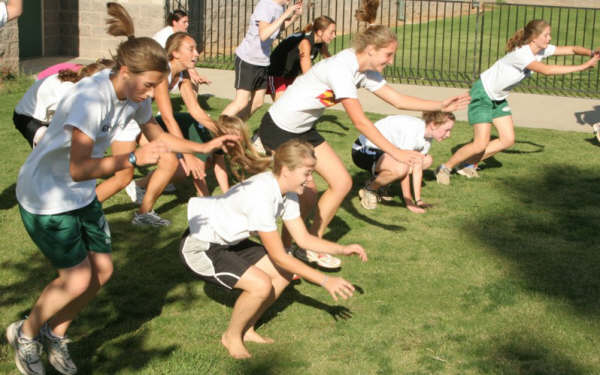
After a jaunt into the
Bear River Canyon and back out, we had a chance to talk to some of the
Lady Falcons who are spearheading the 2006 drive for Fresno.
DyeStatCal:
OK varsity girls, thanks for hanging around after practice. Why don’t
you introduce yourselves?
Sarah Clark: I am a senior
and I’ve been running cross country for three years and I ran
track in middle school. I did the 100 and I have no idea what time it
was.
Sarah Howard: I’m
a freshman so I’ve only been running for a few weeks in high school
and I’ve run for the Silver State Striders since I was an ‘old
bantam’.
Francesca Cole: My name is Francesca Cole and I’m a junior and
I started running my freshman year so I’ve been running for three
years. I couldn’t even run a mile when I first came to Colfax.
I do track but again I started in high school.
DyeStatCal: Angie
Williams was your coach last year and she was here just one year. What
kind of legacy did she leave the team?
Sarah C: Last year was
the first time the girls ever made the state meet so she definitely
did something right. She was amazing. She was really funny.
Francesca: Well I only
ever had one coach before her - Max / Ms. Bussinger – and they
were both good coaches, but Angie was definitely more serious about
cross country, in my experience. She inspired me more, I guess. Before
it was cross country and we’re there to run and have fun but with
Angie we’re there to run, have fun, and be champions, I guess.
DyeStatCal: What’s
the biggest change since Dan King has come into the program here?
Francesca: I think that
Coach Williams inspired me but what Coach King does is that he makes
you want to run. Not only does he inspire me to do well, but he inspires
me to want to do well – and wanting to do well for the team, not
just for myself. He’s made me want to run more than I ever have
before. Until now, I’ve visualized cross country as an individual
sport but he’s made me see it more as a team sport.
Sarah C: I agree with
Francesca. He’s made it seem more like a team sport because he’s
so intent on us making it to state. That’s a big team thing. And
he does make you want to run harder even on the long runs when he’s
not there because you want to get better and you want to improve so
you can do really well.
Sarah H: He’s a
good coach. Everyone has their own way of coaching. He told me if we
only win once, it better be at championships!
DyeStatCal: Give
us a little lowdown on how your ’05 season went and maybe your
best race or favorite course.
Francesca: Last year did
not go superbly for me. I got mono and a stress fracture, both of which
really hindered my running. So I didn’t have the best season.
DyeStatCal: But
you went to state.
Francesca: Well I was
sixth so I generally thought that I didn’t count because only
the top five count. But then at sections or subsections when only the
top three teams could make it or something, me and the 6th girl from
another team were sprinting at the end and I beat her so that was the
most gratifying race. I want to make it to states obviously. I think
we’re going to be a lot better of a team. So I have confidence
that we will make it to state. As far as my favorite course NU is the
first one that comes to mind. I got stung by a bee and I didn’t
run very well, but I did like the course!
Sarah C: My favorite course
is Angel’s Camp and my best race last season was at William Jessup
University because it was raining and I like to run in the rain. Like
Francesca, I feel confident that we’ll make it to states, but
I really, really hope that we do a lot better that we did last year
because we didn’t do as well as we could for some reason –
because we were kind of unfamiliar with the course – and this
year we’ll do better.
Sarah H: I didn’t
really race last year. I just trained. (So far) I’ve liked the
Folsom course but I also liked the Rocklin course.
DyeStatCal: It’s
going to take more than three girls to field a championship team. Which
of your teammates is working hard this year and can really be an impact
runner?
Francesca: I’m going
to talk about Tabitha Bailey because she’s one of my best friends
and she’s an awesome person in general. She loves running and
she’s been working hard all last year, over the summer, and into
the season and I think she’s going to do very well this season.
She’s very, very dedicated to running: more than most anyone I’ve
ever met. She wants to go to Stanford and she wants to run there and
I think she’ll do well this season.
Sarah C: And to add to
that, Sarah is really, really encouraging. She’s the person on
the side screaming as loud as she can.
Sarah H: And she takes
care of the freshmen!
Sarah C: I want to talk
about Ella and Rosie Del Sarto. They’re both in rec soccer leagues
so they have practice and games in addition to soccer and I’m
pretty sure they both take piano lessons and they have AP classes so
they have so much to do. But they’re here all the time. They work
really, really hard and they’re cheerful. They’re just always
really happy; I’ve never seen them sad.
Sarah H: I’ve been
running with Kate Bradshaw for the last three years in track in Weimar
and she’s really quiet but she’s really nice. She gets really
nervous and she doesn’t think she can do something, but she’s
a whole lot better than she thinks she is. Coach King put her up at
varsity for yesterday’s meet – which didn’t happen
– and then she freaked out, but the meet didn’t happen,
so she felt guilty about it.
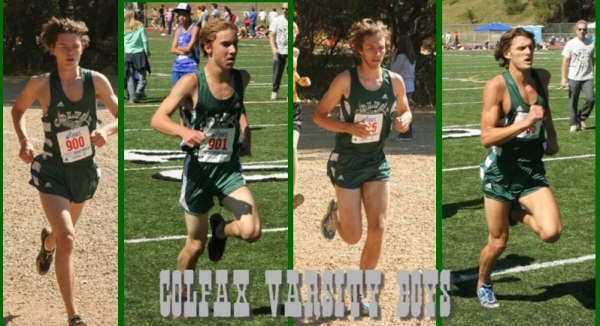
We found the Falcons
during a tough stretch of their schedule with three meets planned over
four days. The Pioneer Valley League meet the day before had been cancelled
due to the fire, but a North Tahoe meet at elevation – incorporated
on the Colfax schedule more for training than competing – was
on the agenda for Friday with Nevada Union the day after. After baking
in the NorCal heat on Tuesday and Wednesday, the Colfax boys ran through
snow flurries just 48 hours later to take the North Tahoe Invite. They
then kept their winning ways alive by taking first at NU on Saturday.
After the parents provided team pasta at practice, the boys shared some
of their thoughts on running at Colfax.
DyeStatCal:
To start, why don’t you guys let us know who you are and what
your running background is.
Rafael Shopfer: (I’ve
been running) since freshman year because a couple of my friends who
were sophomores wanted me to do it. We were kinda bad at first. My sophomore
year it got a little better; I did a couple varsity races. Then junior
year I was varsity the whole year. For track, last year was my first
because ski racing interferes with it. But last year because of all
the rain, track got started so late so I ended up joining it.
Greg Reynolds: I’ve
been with Colfax for four years and I’ve ran since sixth grade,
I think. And I’ve run track the last two years.
Jon Crebbin: I’ve
been on varsity for four years in cross country – and track, except
last year I didn’t do track.
Wesley Cox: I did cross
country in 8th grade and then freshman year and then now. And then I
did track and that’s when I started running in 7th grade.
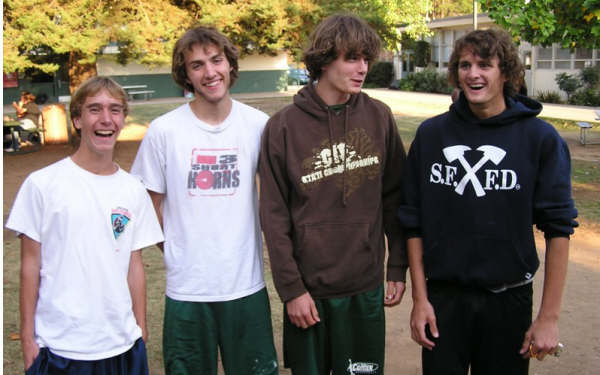
DyeStatCal: There’s
a football game going on across campus right now. There are lots of
sports than compete for your time. What is it about cross country that
makes you do it and why is this time of the season special for you.
Rafael: I actually like
to run on my own with music. Training is hard but I like to do it. I
like to push myself so when I race I’m up there. I like racing
– and training – even though it gets hard and you feel like
quitting. Just keep on running. Keep going. Every day’s a new
day.
Greg: I run because it
really helps you wind down. I have a pretty tough academic schedule
so running’s good for that. I like to test my mental endurance.
Really it’s more of a mental sport than a physical thing.
Jon: I like to run because
I’m a competitive person and I just like to compete. And I like
the feeling after the race or after a good workout when you’re
tired but you feel good about yourself. I like to be fit.
Wesley: I like cross country because there’s
an individual side and a team side so if you’re not that good
of an individual, there’s still a team that helps you out but
maybe if you’re team isn’t so good, at least you can do
well individually. It goes either way. I played soccer for a long time
but I like the feeling after a run. If you put up a best time or a PR,
it’s one of the best feelings.
DyeStatCal: Last
year’s team was section champions and the year before that too,
but you lost 3 seniors in the Top 5. What are some of the obstacles
facing you this year doing the same thing? Is it doable?
Rafael: I think we have
a good team right now. Were pretty strong. We started kind of bad…Jon
was hurt. He missed a couple practices but it looks like he’s
getting back up to pace. (After us) we have Eli (Tuisku). He’s
pretty good. I think he’ll be pretty good once he starts training
with us. We have a couple sophomores… Michael Morgan – he’ll
be up there.
Greg: Last year we were
about 10 deep with the guys that we could go to in case of a race to
win sections with. But this year we have Jon who’s doing better
than last year and Wesley who’s improved a lot so we have pretty
much a solid team.
Rafael: …If no one
gets hurt.
DyeStatCal:
Jon, how do you think the team is coming along?
Jon: Definitely I think
winning section is doable. Staying injury free is the key. We have a
lot of work to do but we have the potential.
Wesley: I think winning the section is possible. I
don’t know how my hopes are though. We’re all going to have
to run a really good race out there to win because there’s some
good competition in the section.
DyeStatCal: If
you could take one aspect of one of your teammates best qualities, and
transport that into your own body, what feature from whom would you
adopt regarding running?
Rafael: Jon Crebbin has
good strategy. He doesn’t need anyone to pace off of him. He always
has his own strategy. He just runs a solid race.
Greg: I would probably
take Wesley or Jon’s competitive nature. If someone passes them,
they don’t let it go that easily, so I’d probably take that.
Jon: I’d probably
take from – well, all three of these guys – but I’d
probably take Greg’s mental edge. He’s really confident
before a race. And that’d be nice to have – more confidence.
Wesley: Yeah, I’d probably go off Greg Reynolds,
too, because he’s always calm because if a guy will pass me and
I’ll just panic and I might go hard and screw up my race. Jon
Crebbin has a really good kick and I need to work on that.
DyeStatCal:
Everyone ran for Coach Angie. Tell us a little about the legacy that
Angie left and what Coach King has brought to you.
Rafael: When Angie was
coaching, she was mostly actually with the girls. She would give us
hard workouts, but we weren’t pushed as hard. I think Coach King
is really good with us – and the girls. He gives us harder, better,
longer workouts and for the girls the workouts are as tough for them
as they are for us.
Greg: The three seniors
have been through three coaches and we’ve really been building
throughout each coach. We had Max two years ago – who was a little
crazy in his own way (in terms of training) - and Angie was a dropoff
from that – but Coach King is more of that elevated training except
at a more sane level. It’s more calculated.
Jon: I think the one thing
Coach King can do for us is impart his knowledge. He has a lot of knowledge
about the sport. He’s been all over the place and he’s been
in a lot of situations and he’s been with some of the best coaches
like Coach King (Bob King – Del Campo). So he has a lot to offer
the team if we follow what he says and buy into his system.
Wesley: Maybe it’s because I’m varsity
this year, but one thing about Coach King is my motivation has gone
way up. I know with myself – and other runners too – he
brings motivation. He makes them want to get out there and do the best
they can do.
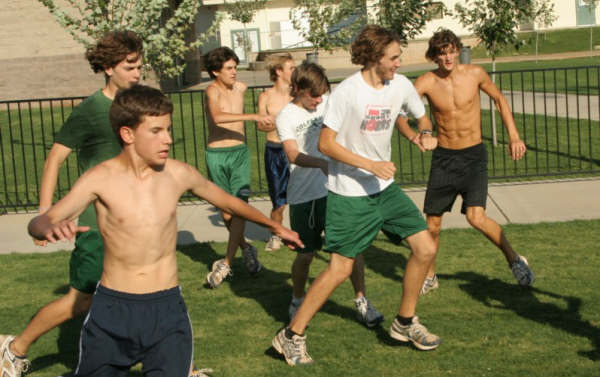
DyeStatCal: If
you can think of one, does anybody have a ‘most embarrassing’
or ‘funniest’ moment in the sport of cross country?
Rafael: Actually it wasn’t
in Colfax history, but I lived in Switzerland for a year and they have
all sorts of sports going on there and they had this one race –
about 2.2 miles – and I had never ran long distance before. So
I get to this race, and I’m like ‘I can win this probably’.
And so there’s a rope at the starting line that they let down
to go so all the top guys are holding onto the rope. So I’m holding
onto the rope and I’m thinking ‘I can win this thing’
and I didn’t know these guys were top guys from all over the world.
And I had no clue how to race….the gun goes off, I kind of jog,
and all these guys knock me down. I hit the floor, scrape both my knees,
and everyone’s just… gone! So I tried to sprint for about
800 meters to catch up and then I was gone, and all these really bad
runners were passing me, and I’m dead. That was pretty humiliating.
DyeStatCal: Boy,
it’s a good thing we still have you in the sport.
Rafael: Now I want to
go back to Switzerland and get even.
Wesley: It was actually last year when we went to the
Stanford Invitational. I was running neck and neck with this one kid
going up this one hill. And all of a sudden he just fell! And for the
rest of the race I was just crackin’ up. I didn’t do anything,
he just slipped forward and did a nose-dive.
Jon: At last year’s
sections, we had a really good team. We were at the starting line and
I was reaching down to tie my shoes. And the starter says ‘Ready’
and he raises the gun, and I’m down tying my shoes, so I jumped
back and the gun went off. Everybody took off and I tripped Joel Iventosch
– who was on the team last year – so he hit it hard. They
didn’t restart it so everyone was upset. So that was a really
bad start. Every practice after that it was like, “I can’t
believe you tripped me, Jon!”
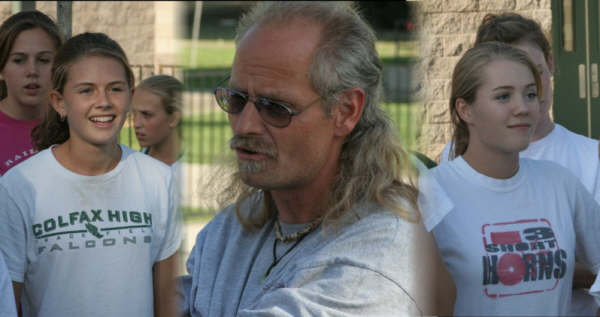
Dan King began coaching
– reluctantly – in Alaska in 1984. While an assistant at
Lathrop High School, the team won the state title in cross country in
1986 and took second in track and field. King moved to the mainland
and spent 10 years at Brea Olinda in Orange County where that previously
moribund team won five Orange League titles in boys cross country and
five more in boys track. After relocating to Northern California, Dan
continued the excellent running tradition at Nevada Union and was named
the Sacramento Bee girl’s coach of the year in 1999 and the boy’s
coach of the year in 2003.
Coach King’s
eyes sparkle when discussing the current Colfax team. He clearly seems
to be more in his element amidst the gold mines, canals, and tall pines
along the glistening Sierra ridges than biding his time in the heat
and traffic of Sacramento. In a very entertaining conversation, we first
wanted to find the sources – after all these years – of
his coaching philosophy.
DyeStatCal: What
in the past has molded your philosophy and molded how you train a team.
Who and what have most affected you?
Dan King: I thought about
that today actually because that’s a big question and I think
that along the way people influence us whether we realize it or not.
I was in military in at Fort Wainright, Alaska and a gentleman by the
way of Jeff Sink became one of my very best friends. His father was
a 1948 Olympian, Roland Sink (1500 meters, London, photo at http://frankwykoff2.com/tree7.htm
). It was at Lathrop High School and I called Jeff and said hey, I’d
like to come out and run with you guys. This is what I’ve done,
but I just want to run. So I came out and the next thing I knew I was
an assistant coach. And I said, “Jeff this really isn’t
what I want to do.” But Jeff said. “But the kids respond
to you so well.” So I was there for a couple years and then Jeff
actually followed me to Southern California and coached with me at Brea
Olinda High School. So Jeff Sink would have to be the first one. All
these people that I want to talk about briefly – there were some
things that I love what they did and some things that I thought, “What
was that about?”
DyeStatCal: That’s
coaching isn’t it? Learn a little here, learn a little there?
Coach King: It really
is. And I took a lot from Jim Sackett at Cal Poly Pomona, my running
coach there. An amazing guy. At first with Jim it was like, “Boy,
this guy’s way out there.” He didn’t seem to me like
he related to people…(but he related to kids). I was not by any
means close to being the fastest runner on the team. But part of what
I like about Jim was not only does he know the sport, but if you’re
out there busting your end, you could run for him. Work your butt off.
That’s all you have to do! And I worked my butt off. And he yelled
at me and screamed at me, “You’re running too slow”,
“Why are you looking at your watch?” I can remember one
race at Mt. SAC running 10,000 meters on the track, which is just horrid.
And he was “King, what the hell are you looking at your watch
for? I can get your splits.” So the next time around, I threw
the watch up in the stands….I was pissed. But Jim Sackett had
a huge influence on me. One of the coaching things I learned from Jim
was I went from miles to minutes. It’s much easier to do minutes.
I used to be a fanatic about miles in exact distances. I’d get
out with the wheel and measure and if wasn’t to the foot, it didn’t
count. And now it’s like, I need time on your feet. And I learned
that from Jim. Right now the varsity boys are running 80 minutes a day
and they’ll go up from there. And it’s quality minutes.
They’re probably running 6:45-7:15 pace. But it’s time on
their feet for me because I know they’re going to get turnover.
In 23 years of coaching, Bob King
has made a huge impact on what I do today - huge. We coached together
just two years. When I left Nevada Union, he called me within a week
of him finding out. “We’d love to have you down here.”
And I said, “Carmichael’s a long way.” And he said,
“Dan, you can contribute to the program. I want my boys to be
around you.” So I’ve been to his camps, and done lectures,
and been to the practices that I could, I’ve traveled with them.
By the end of camp the first year, they started calling me Coach King
Squared because every time they’d say “Coach King!”,
it was “Who?” Bob runs a great show. What I really learned
from Bob – and he’s been coaching for 40 years, he’s
the most second most successful coach in the section behind Walt Lange
– is that the kids love him. He’s very methodical, it’s
very planned, and it’s very straightforward. There’s no
game-playing. The kids love him, they respond to him so well. The thing
that about Bob, and it didn’t even hit me until we talked about
it, one of the things I felt hurt us last year – and he’ll
tell you the same thing – is that me doing the rankings hurt us.
One of the things I know is the sport. I know who the kids are and who
the coaches are and I was incessant with the paperwork. I could tell
you what the Bret Harte girls ran team time in a varsity race 3 years
ago. That was my job. But Bob’s philosophy was: we train, we run,
we race, and we can’t do anything about anybody else. Whoever’s
there, we beat ‘em or we don’t. And it’s that simple.
Sometimes the rankings are about what people are showing, not about
what they might be.
DyeStatCal:
And the people that are doing the rankings…they might be missing
some teams. There are some other good teams out there too.
Coach King: They are…I
know. And the other guy is Clyde Lehman at Nevada Union. He actually
recruited me from Southern California. I spent 10 years at Brea Olinda
high school and I had brought my teams up there twice to the Nevada
Invitational and when he’d bring his kids down, they’d stay
in our gym. He was coaching/working with the Mastalair twins when I
had a kid out of Alaska, Mike Kramer. They were all right at 9:10/9:11.
And I sent Mike down to the Golden West and the Mastalair twins kicked
his …. And they went to Keebler and Mike beat ‘em in Chicago.
So I knew Clyde from them.
He said to me one time when he
brought his kids down to the Mt. SAC Invitational – and I was
beating myself up because why the kids were racing so poorly –
and he looked at me and said “Dan, have you ever had a kid go
to the starting line and say to you, ‘Coach I want to run poorly
today’. You know when that kid steps on the line, he’s going
to give it everything he’s got - or she’s got. Look at the
way you train them. You tell them they don’t win championships
in September and October … so how do you expect them to race to
beat all those guys.” And that was huge for me. Like, Wow! I completely
changed my outlook on how kids perform… right then.
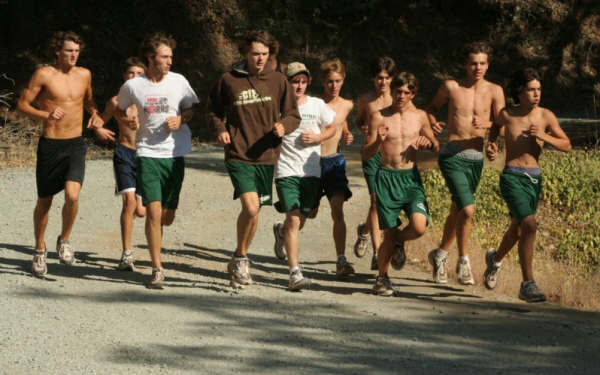
DyeStatCal:
Let’s look at a season in a modular way. How do you like the summer
to go? What do you do in September? How do you want October to go and
where do you want to be when that month is over? And then break down
November, as you see it.
Coach King: I’ll
try to do that. I’ll tell you first of all I believe that championships
are really won during the summer. Titles don’t come until November,
but they’re won in the summer. And I think it’s imperative
that kids train in the summer. It doesn’t have to be high mileage,
it doesn’t have to be race pace, but they need to run. And they
need to run with each other. They’ve got to bond. Training’s
a huge part of it and camp’s a huge part of it. I think summer
camp is used for bonding. It’s training, but it’s really
used for bonding. (The training is) building up the mileage, getting
the homework in for building your endurance levels so they’re
not dying out here in September.
In September we do a lot of mileage. We train through most of our races.
We clearly train through races. I’m not saying that early season
races aren’t important but they’re not nearly as important
as the end of the season. And that’s been a tough thing for these
kids who’ve had three coaches in three years. We do morning practices
three times a week, we’re in the weight room two days a week in
the morning. Building that core is so important to the end of the season.
Everything we’re doing in the summer, in September, or in October,
is clearly building toward November. We’re doing longer repeat
stuff, we’re doing mile repeats. We’re doing hill repeats,
we do lots of hills.
Early October is a time for us where
we ease back a little and see what progress we’ve made, let ‘em
put their racing flats on. Clovis is a huge race for us.
DyeStatCal: Like
a midterm exam?
Coach King: Absolutely.
It’s six weeks from the state meet. In six weeks I can fix something
that’s broken. I can’t do it two weeks from the state meet.
And so it’s a huge step for us so we’ll go there with bells
on and try to get the job done. And if we don’t get the job done,
it’s not too late. And then the last two weeks of October we pick
it back up a little bit but we do a lot more leg work meaning we’re
going to do threes… One of my favorite workouts is doing threes
until the cows come home, until you just can’t do 300’s
anymore. And I love doing 500’s because the kids respond to that.
And as a general rule we don’t do that on a flat surface.
DyeStatCal: Just
curious. Why do they like the fives more?
Coach King: It’s
unknown to them. And that’s the reason I like it. I don’t
like doing fours because then they start calculating and then they start
worrying about if they’re going to fast or slow. They don’t
get to calculate the threes and fives and the sevens. And we’ll
do some shorter hills. We won’t stop doing hills. I think I’ve
got hills scheduled right up until ten days before the section championship.
One of the things I think coaches may do wrong at the end of the season
is they cut back too much. We have conditioned the kids to do this for
two and a half months, and a lot of coaches come back and say, “Now
we’re going to cut in it half, cut it in half, cut it in half…”
So instead of running 500 minutes for a week, now you’re down
to 250 minutes or 150 minutes for the week. I think that’s one
of the reasons – for my 1999 and 2000 teams at Nevada Union for
the girls – I think one of the reasons they didn’t run as
well at the state meet. They said “Coach, you cut us down to nothing.
Either you didn’t believe in us so you cut us back - or you changed
the routine, so now…’What are we doing?’"
DyeStatCal: How
much rest then do you need before the state meet?
Coach King: I hate that
we have a week off. Which is why we go to the Fire Trail (at Point Reyes)
- which is what Coach King does, so we’ll go that with them this
year. Right after league we’re going to go up to Donner Pass and
run at Lake Donner. It’s something that we did at NU and something
Coach Lehman did prior to that and give them a little break (from competition)
but still it’s a huge climb. One of the things I’ve done
fairly well over the years is peak my kids and I think you just can’t
cut them back too much, or they’ll fall apart.
DyeStatCal: Your
2006 teams here at Colfax. How good can the girls’ team be and
how good can the boys’ team be?
Coach King: The boys team
we have 3 of seven returning – three seniors: Greg Reynolds, Jon
Crebbin, and Rafael Shopfer. And they work really hard. And for anybody
to take a hit like we took… They’re section champions two
years in a row, 6th at state meet two years ago and 7th last year. But
we have three boys on the team with state meet experience and two with
two year’s experience. How good are the boys? I firmly believe
they are a Top 5 team in the state. I really do. I know that Rich has
written that Division 4 isn’t very deep after Big Bear (Big Bear
is incredible…. I think they’re one of the Top 10 teams
in the country), but I think we’re Top 5. What has to happen in
order for that to take place is that Rafael has to be a team player.
He is a team player, but he doesn’t race like a team player. Rafael
is a guy who thinks if he doesn’t get out fast enough, he’s
not going to stay in the race, but Rafael can’t stay in the race
when he gets out too fast. Most kids can’t. They blast the first
800 and then God takes over, and He decides what the next 2 ½
miles are like. That’s one of Bob King’s lines. I’ve
watched Rafael do it three times now. Now he gets to run my way. I’m
lacking a fifth man, but I have a couple there.
For the girls. the numbers look good.
Their training this summer wasn’t as good as the boys. Sarah Clark
looks good. Sarah Howard looks good. The Del Sarto twins look really
good (but they wouldn’t tell you that). Tabitha Bailey and Francesca
look good. They’re going have to run somewhere between 21-flat
and 19:30 and I’ve got two girls (the Sarahs) that can go between
19-flat and 19:30. They may be able to go under 19, we’ll see.
Sarah Clark is faster than what she shows.
